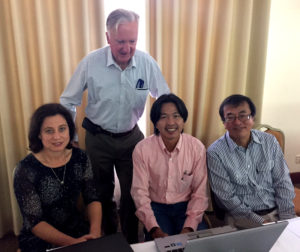

The Business of Food Security in lower Mekong,
May 26, 2015
A workshop is currently underway on sustainable intensification of rice-based systems in the lower Mekong region. The workshop, convened by the University of Sydney on behalf of the Australian Centre for International Agricultural Research (ACIAR), runs from 25 to 30 May 2015 in Siem Reap, Cambodia.

Our Chief Executive, Dr Denis Blight, is attending and will address the workshop on Friday on “The Business of Food Security,” very much in-keeping with the focus of our annual conference this year.
In his presentation, Denis will draw on early experience of a project in Africa, led by an alliance between the Syngenta Foundation for Sustainable Agriculture, ACIAR and its Australian international food security research centre, and the Crawford Fund, in partnership with public and private sector agencies in Africa, to elaborate on the need for improvements in the education, training and professional development of plant breeders to improve food security.
Dr Blight will argue that the food security challenge is primarily a business issue for all in the food supply and demand chain – from small farmers, input suppliers, processors, retailers and many others.

“Circumstances in Africa and Asia differ. There is a wealth of experience in the region, from the public and private sectors. I am inspired by their example as I am by that of Australian farmers who daily struggle with risk and a hostile environment,” he said.
Denis will discuss the global experience in uptake of new crop varieties, factors contributing to the uneven uptake, what will contribute to success, and the significant roles of the private sector and of capacity building.
“Both the private and public sectors have a contribution to make but as economies mature, and public resources diminish, it can be expected that in addition to national and international public breeding programs, private companies will become increasingly involved in breeding new high performing varieties to meet customer requirements and market demand in countries of this region.” he says.
In his presentation, he will raise the question – whilst none of us wishes to discourage increased public investment in international agricultural research – indeed advocacy for an increase in such investment underpins the Crawford Fund’s purpose – might there not be some benefit in increasing the relative weight of private sector investment, or at least in infusing private sector thinking into public sector programs?
Those who would like to contribute to a discussion on the importance of collaboration and partnership between the public and private sectors to achieve sustainable intensification and improved food security, are encouraged to come along to our annual conference from 10-12 August 2015.
[sbslideshow_deploy id=’5636′]




